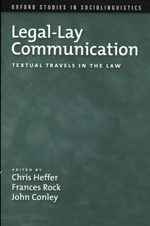The discourse of police interviews
- ISBN: 9780226647791
- Editorial: University of Chicago Press
- Fecha de la edición: 2020
- Lugar de la edición: Chicago. Estados Unidos de Norteamérica
- Encuadernación: Rústica
- Medidas: 23 cm
- Nº Pág.: 375
- Idiomas: Inglés

Forensic linguistics, or the study of language and the law, is a growing field of scholarly and public interest with an established research presence. The Discourse of Police Interviews aims to further the discussion by analyzing how police interviews are constructed and used to investigate and prosecute crimes.
The first book to focus exclusively on the discourses of police interviewing, The Discourse of Police Interviews examines leading debates, approaches, and topics in contemporary police interview research. Among other topics, the book explores the sociolegal, psychological, and discursive framework of popular police interview techniques employed in the United States and the United Kingdom, such as PEACE and Reid, and the discursive practices of institutional representatives like police officers and interpreters that can influence the construction and quality of linguistic evidence. Together, the contributions situate the police interview as part of a complex, and multistage, criminal justice process. The book will be of interest to both scholars and practitioners in a variety of fields, such as linguistic anthropology, interpreting studies, criminology, law, and sociology.
Chapter 1. Introduction
Marianne Mason
Section 1. The Discourse of Reid and PEACE
Chapter 2. When Police Interview Victims of Sexual Assault: Comparing Written Guidance to Interactional Practice
Elizabeth Stokoe, Charles Antaki, Emma Richardson, and Sara Willott
Chapter 3. Obtaining Valid Discourse from Suspects PEACE-fully: What Role for Rapport and Empathy?
Ray Bull and Bianca Baker
Chapter 4. The Guilt-Presumptive Nature of Custodial Interrogations in the United States: The Use of Confrontation, Appeals to Self-Interest, and Sympathy/Minimization in the Reid Technique
Marianne Mason
Chapter 5. The Discourse Structure of Blame Mitigation in a Police Interrogation
Philip Gaines
Section 2. Police Interview Dynamics and Negotiation
Chapter 6. Now the Rest of the Story: The Collaborative Production of Confession Narratives in Police Interrogations
Gary C. David and James Trainum
Chapter 7. Patterns of Cooperation between Police Interviewers with Suspected Sex Offenders
Tatiana Tkacukova and Gavin E. Oxburgh
Chapter 8. Supporting Competing Narratives: A Membership Categorization Analysis of Identity Work in Police-Detainee Talk
David Yoong and Ayeshah Syed
Section 3. Discursive Transformations in Bilingual Police Interviews
Chapter 9. Narrative Construction in Interpreted Police Interviews
Ikuko Nakane
Chapter 10. Interactional Management in a Simulated Police Interview: Interpreters’ Strategies
Sandra Hale, Jane Goodman-Delahunty, and Natalie Martschuk
Chapter 11. Non-Native Speakers, Miranda Rights, and Custodial Interrogation
Bethany K. Dumas
Section 4. The Discursive Journey and Institutional Applications of Police Interviews
Chapter 12. “Tell Me in Your Own Words…”: Reconciling Institutional Salience and Witness-Compatible Language in Police Interviews with Women Reporting Rape
Nicci MacLeod
Chapter 13. “Are You Saying You Were Stabbed . . . ?”: Multimodality, Embodied Action, and Dramatized Formulations in “Fixing” the Facts in Police Interviews with Suspects
Alison Johnson
Chapter 14. Functions of Transmodal Metalanguage for Collaborative Writing in Police-Witness Interviews
Frances Rock
Chapter 15. Reconstructing Suspects’ Stories in Various Police Record Styles
Tessa (T. C.) van Charldorp
Chapter 16. Police Records in Court: The Narrative Fore- and Backgrounding of Information by Judges in Inquisitorial Criminal Court
Fleur van der Houwen







